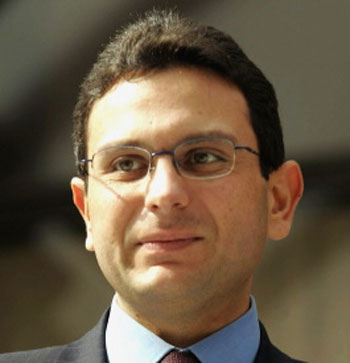Christian politicians urge youths to take part in polls
Freedom ‘did not emerge from a void’
By Nada Bakri
BEIRUT: Various Christian politicians urged Lebanese youths and civil-society sectors to participate in the upcoming parliamentary elections to reform Lebanon and help it realize its sovereignty, freedom and independence.
participate in the upcoming parliamentary elections to reform Lebanon and help it realize its sovereignty, freedom and independence.
Kesrouan MP Farid Khazen, Free Patriotic Movement (FPM) member Ibrahim Kanaan as well as Alain Aoun and George Abi Zeid from the National Bloc were speaking during a conference at Notre Dames University, in Zouk Mosbeh.
Khazen said: “We are currently facing a historic situation.
“We should prove our ability to rule ourselves and reform our country or we will be faced with a catastrophe no one can assess the results of.”
Khazen explained to a large audience of NDU students and professors that Lebanese politicians and decision-makers are the reason behind the deterioration of the country’s political situation.
 BEIRUT, Lebanon – In a sign of the dramatic changes in a Lebanon free of Syrian control, Christian opposition leader Michel Aoun visited his former arch foe in jail Wednesday and called for his release after 11 years in prison, mostly in solitary confinement in an underground cell.
BEIRUT, Lebanon – In a sign of the dramatic changes in a Lebanon free of Syrian control, Christian opposition leader Michel Aoun visited his former arch foe in jail Wednesday and called for his release after 11 years in prison, mostly in solitary confinement in an underground cell. May 18, 2005
May 18, 2005  Art students paint on fabric covering a 5-meter-high wall of sandbags, surrounding the United Nations offices in Beirut, Lebanon, Wednesday, May 18, 2005. The sense of security built up over years of Lebanon’s postwar calm was shattered when a series of bomb blasts hit the capital over the past three months. A U.N. mission is scheduled to arrive in Beirut later this week to conduct an inquiry on the bomb blast that killed former Lebanese Prime Minister Rafik Hariri. (AP Photo / Hussein Malla)
Art students paint on fabric covering a 5-meter-high wall of sandbags, surrounding the United Nations offices in Beirut, Lebanon, Wednesday, May 18, 2005. The sense of security built up over years of Lebanon’s postwar calm was shattered when a series of bomb blasts hit the capital over the past three months. A U.N. mission is scheduled to arrive in Beirut later this week to conduct an inquiry on the bomb blast that killed former Lebanese Prime Minister Rafik Hariri. (AP Photo / Hussein Malla)
 Christian civil war foe in his prison cell near Beirut on Wednesday, drawing a line under a bloody rift that tore their community apart 15 years ago.
Christian civil war foe in his prison cell near Beirut on Wednesday, drawing a line under a bloody rift that tore their community apart 15 years ago.


